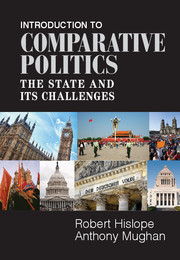5 - Linkage and Representation
Published online by Cambridge University Press: 05 June 2012
Summary
The last chapter outlined the major political institutions whose interactions shape the contrasting patterns of governance found in democratic and authoritarian regimes. Taken together, these institutions comprise the governance framework within which political deliberation and discussion take place and public policy outcomes are decided. These outcomes involve in large part the passage of laws that are binding on the people to whom they apply, which is more often than not the population of the state as a whole. New laws are introduced, existing ones are amended, and some are repealed as governments respond to changes in their domestic and international social, economic, and political circumstances. Income tax levels may be raised, for example, to compensate for increased government spending as the result of involvement in war. Alternatively, the voting age may be reduced to allow for changing definitions of adulthood in society as a whole. Seen from an institutional perspective, governance could easily be seen as a one-way process of imposition from above – those in government decide what is best for their charges and shape and reshape their legal environment to promote newly appropriate behaviors and outcomes.
It is misleading to see the governance process in this light, however. Previous chapters have reiterated that governments, even authoritarian ones, cannot ignore the wishes of their people without risking a popular reaction that might lead ultimately to their ejection from power. Such ejection will probably be peaceful and uncomplicated in democracies as governments forfeit the next election for having failed to satisfy their citizens. By contrast, it might take longer and be less than peaceful in authoritarian regimes where there is not the same shared expectation of responsiveness and accountability to the people and governmental power is forfeited only begrudgingly. Nonetheless, the bottom line in both types of regime is that governance is a two-way process; governors cannot function in the absence of the governed, and vice versa.
- Type
- Chapter
- Information
- Introduction to Comparative PoliticsThe State and its Challenges, pp. 134 - 170Publisher: Cambridge University PressPrint publication year: 2012



